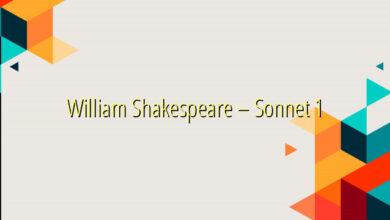
William Shakespeare – Sonnet 121
Tis better to be vile than vile esteemed,
When not to be receives reproach of being;
And the just pleasure lost, which is so deemed
Not by our feeling, but by others’ seeing:
For why should others’ false adulterate eyes
Give salutation to my sportive blood?
Or on my frailties why are frailer spies,
Which in their wills count bad what I think good?
No, I am that I am, and they that level
At my abuses reckon up their own:
I may be straight though they themselves be bevel;
By their rank thoughts, my deeds must not be shown;
Unless this general evil they maintain,
All men are bad and in their badness reign.
The theme of this sonnet is a variant of the proverbial idea that ‘There is small difference to the eye of the world in being nought and being thought so’. It links in also with ideas of the inadequacy of the world’s judgements, the injustice of criticism, and, obliquely, with the often expressed cynicism that committing sin is no crime. The real crime is to be discovered committing it. This last idea is neatly expressed in Ben Jonson’s poem ‘To Celia’, reproduced below.
We may also speculate that it is a poem that was written in answer to some antecedent situation, a situation in which perhaps the youth accepted grudgingly the poet’s excuses of the last three sonnets, but still cited evidence from other accusers of the poet’s supposed infidelities. Finally, in exasperation, the poet refuses to defend himself with any further argument, but he insists instead that he has a right to be himself, and to have his character freed from the dictatorial powers of those who would interpret it for him in terms of their own baseness.
There is a disturbing weakness in the argument of the poem, in that it fails to confront the contradiction that diverting oneself with a love for someone else, however just and pure, however unlike that implied by the knowing glances of the corrupted spies, is nevertheless a falling away from total devotion and commitment, a dereliction from the ideal so strenuously expressed in 116, for example. How can the youth be loved with the same fervour if half of the poet’s energies are wasted on satisfying his own sportive blood, in following other liaisons, wherever they may lead him? Neither here nor anywhere else in the series is the dilemma resolved, and one is left with the slightly uncomfortable feeling that the poet, like the youth, believes that fidelity can be compartmentalised.
In fact one’s attention is distracted by the ethical problem of the world’s frequent errors and how to come to terms with them. It is painful to be misjudged, especially as one does not even have the benefit of enjoying the pleasures one has supposedly stolen illicitly. Much better to have been bad in the first place, for if one is to be accused of fornication, one might at least have the pleasure of doing it. Such seems to be the argument of the poem, and one is tempted to look for some hint of the old adage that ‘virtue is its own reward’, but it does not appear. To be fair to the poet we should note that he never actually admits to wrongdoing, for his concern is mainly with wrong accusations. ‘My frailties’ and ‘my sportive blood’ are generalities which may be read as the imputations of vice put upon him by his accusers, even as the ‘just pleasure’ may be simply the pleasure of being just in one’s actions. It may not be the pleasure of loving someone else.
However all this is somewhat unfair and it is a little unwise to demand that a poem say something other than that it evidently tries to say, for what to us may appear as contradictions may not have been seen in that light by the original participants. Probably the fact that there are contradictions gives more life to the poems than if they were all smooth and even throughout.
POEM TO CELIA
Come, my Celia, let us prove,
While we can, the sports of love.
Time will not be ours for ever,
He, at length, our good will sever.
Spend not then his gifts in vain;
Suns that set may rise again,
But if once we lose this light,
‘Tis with us perpetual night.
Why should we defer our joys?
Fame and rumour are but toys.
Cannot we delude the eyes
Of a few poor household spies,
Or his easier ears beguile,
Thus removed by our wile?
‘Tis no sin love’s fruits to steal,
But the sweet thefts to reveal;
To be taken, to be seen,
These have crimes accounted been.
Ben Jonson, Volpone.III.5.
The 1609 Quarto Version
TIS better to be vile then vile eſteemed,
When not to be,receiues reproach of being,
And the iuſt pleaſure loſt,which is ſo deemed,
Not by our feeling,but by others ſeeing.
For why ſhould others falſe adulterat eyes
Giue ſalutation to my ſportiue blood?
Or on my frailties why are frailer ſpies;
Which in their wils count bad what I think good?
Noe,I am that I am,and they that leuell
At my abuſes,reckon vp their owne,
I may be ſtraight though they them-ſelues be beuel
By their rancke thoughtes,my deedes muſt not be ſhown
Vnleſſe this generall euill they maintaine,
All men are bad and in their badneſſe raigne.
Commentary
1. ‘Tis better to be vile than vile esteemed,vile = evil, worthless, base.
esteemed = considered, thought to be so. The compressed meaning of the line expands to ‘It is better to be evil, than to be adjudged to be evil without actually being so’. Note that vile is an anagram of evil.
esteemed = accounted, considered to be, estimated as (a vile being).2. When not to be receives reproach of being;When the reproach and guilt of sinning is attached to one who has not even sinned.
not to be = not being vile3. And the just pleasure lost, which is so deemed3-4. These two lines may be interpreted in several ways. Predominantly the sense hinges upon the meaning of the just pleasure, which is presumably the pleasure obtained by being virtuous, by not being vile. If our actions are truly virtuous, we should reap the reward not only of the consciousness of our own desert, but also of the warm glow derived from the awareness of others’ approval. This pleasure however may be lost not because of our own judgements, but because of the warped sense of outsiders, who twist all that they see to accord with their own warped natures.4. Not by our feeling, but by others’ seeing:See the note to the previous line.5. For why should others’ false adulterate eyesadulterate = adulterated, mixed with impurities. The word however also suggests adulterous, which in fact is its meaning in the following passage from Hamlet:
Ay, that incestuous, that adulterate beast,
With witchcraft of his wit, with traitorous gifts,–
O wicked wit and gifts, that have the power
So to seduce!–won to his shameful lust
The will of my most seeming-virtuous queen. Ham.I.5.41-5.6. Give salutation to my sportive blood?Give salutation to = greet with familiarity, as if it was well known. Give approval to.
my sportive blood = my lustiness, my sexual adventures, (which they presume to know about, even though they have no evidence other than their own behaviour).7. Or on my frailties why are frailer spies,

…What is it that they do
When they change us for others? Is it sport?
I think it is: and doth affection breed it?
I think it doth: is’t frailty that thus errs?
It is so too: and have not we affections,
Desires for sport, and frailty, as men have? Oth.IV.3.93-8
sport is often used in connection with sexual romps, as in the Ben Jonson poem above: let us prove …. the sports of love.
frailer spies = spies who are even more prone to sins of the flesh than I am.
The syntax of the line leads one to expect a word like ‘set’, or ‘placed’, to round it off, for one anticipates the meaning ‘Why are spies, more libidinous than I am, set upon me to record my escapades?’, but the main verb does not appear. The following line, instead of finishing the sentence, provides a phrase qualifying the frailer spies. One therefore has to supply the deficiency mentally by reading the line as if it were
on my frailties why are frailer spies set?
However a correspondent suggests to me that frailer could be an adjectival noun meaning ‘frailer people’, hence giving a meaning to the line of ”Why are frailer people (i.e. more sinful than I am) acting as spies on my frailties?’8. Which in their wills count bad what I think good?Which = who, sc. the spies.
in their wills = governed by their own lustful tendencies.
what I think good – the poet seems to be saying that his own errors and crimes seem good to him, though bad to others. Perhaps one should not insist too much on exactitude, and allow for the meaning to be that, in a hypothetical case, the absolute arbiters of good and evil should not be the lechers and busybodies of the world, but that each person should have the right to define the justification for their own actions unhampered by the world’s opinion.9. No, I am that I am, and they that level
I am that I am – Although superficially this means “I am an independent person, and my personality is not dictated by what these ‘spies’ see in me”, it is an exact copy of the biblical phrase ‘I am that I am’, (Exodus 3.14, Geneva Bible) which God utters to Moses. The echo is therefore unlikely to be unintentional. According to SB it makes the speaker sound smug, presumptuous and stupid.(SB p.410). However it could be interpreted as ironic, or rueful (see JK p. 342). If ironic, it is a glance at the richness of the Renaissance tradition, in which man is the pinnacle of creation. As Hamlet declares:
What a piece of work is a man! how noble in reason! how infinite in faculty! in form and moving how express and admirable! in action how like an angel! in apprehension how like a god! the beauty of the world! the paragon of animals! And yet, to me, what is this quintessence of dust? Ham.II.2.303-9.
For, even without Hamlet’s pessimism, the simple declaration of identity, or the simple definition of personality, boils down to ‘I am that I am‘, just as, in the attempt to define the richness of the beloved’s personality, all praise finally had to be abandoned in favour of the solitary statement ‘you alone are you‘.
Who is it that says most, which can say more,
Than this rich praise, that you alone, are you? 84
This biblical statement here, ‘I am that I am’, is therefore the counterpart of the earlier claim about the beloved youth, that he outdid all praise simply by being himself. Here the poet wishes to assert that he is not the person that other rapacious characters report him to be. He is instead, whatever they may say about him, that quintessence of dust imbued with the divine spark which is his essence and being.
There may also be a link to Wyatt’s poem
I am as I am and so will I be,
which I give in full at the bottom of the page. In fact the echoes from Wyatt may be more telling than those from the Bible, and I urge readers to glance at it, for it is a joy in its own right.
Note that SB also suggests a pun on ‘Will I am’ = WILLIAM, combining the will of line 8 with the I am of this line, a probable conjunction because God’s reply to Moses in the Exodus passage is a response to Moses’ question “If they say unto me, ‘What is his name?’, what answer shall I give them?
level = aim at, criticise. The metaphor is from archery.10. At my abuses reckon up their own:abuses = sins, sexual crimes, seductions, betrayals, ravishments. The most frequent meaning in Shakespeare is ‘deception’. Here the context seems to demand something stronger.
reckon up their own = accuse me of crimes which are not mine but are ones that they have committed.11. I may be straight though they themselves be bevel;straight = honest, uncorrupted, true, virtuous.
bevel = crooked, corrupt. In heraldry the bevel was a Z shaped line.12. By their rank thoughts, my deeds must not be shown;By = according to the standard of.
rank = lascivious, licentious, gross, luxuriant.
shown = described, published to the world.13. Unless this general evil they maintain,this general evil = the evil described in the following line. Or, the general evil of describing others’ characters by their own rank thoughts.
they maintain = they (those who reckon up my abuses) insist on declaring.14. All men are bad and in their badness reign.
in their badness reign = carry all before them as a result of their vices.
Poem by Sir Thomas Wyatt, circa 1530.
1.
I am as I am and so will I be
But how that I am none knoweth truly,
Be it evil be it well, be I bond be I free
I am as I am and so will I be
2.
I lead my life indifferently,
I mean nothing but honestly,
And though folks judge diversely,
I am as I am and so will I die.
3.
I do not rejoice nor yet complain,
Both mirth and sadness I do refrain,
And use the mean since folks will fain
Yet I am as I am be it pleasure or pain.
4.
Divers do judge as they do true,
Some of pleasure and some of woe,
Yet for all that no thing they know,
But I am as I am wheresoever I go.
5.
But since judgers do thus decay,
Let every man his judgement say:
I will it take in sport and play,
For I am as I am who so ever say nay.
6.
Who judgeth well, well God him send;
Who judgeth evil, God them amend;
To judge the best therefore intend,
For I am as I am and so will I end.
7.
Yet some that be that take delight
To judge folks thought for envy and spite,
But whether they judge me wrong or right,
I am as I am and so do I write.
8.
Praying you all that this do read,
To trust it as you do your creed,
And not to think I change my weed,
For I am as I am however I speed.
9.
But how that is I leave to you;
Judge as ye list, false or true;
Ye know no more than afore ye knew;
Yet I am as I am whatever ensue.
10.
And from this mind I will not flee,
But to you all that misjudge me,
I do protest as ye may see,
That I am as I am and so will I be.
Notes:
1. bond = slave, vassal.
2. indifferently = calmly.
diversely = differently.
3. use the mean = follow the golden mean, the middle way.
since folks will fain = since people desire it.
4. divers = many different sorts of people.
as they do true = (?) that they are acting rightfully
of pleasure… of woe = for pleasure … for woe.
5. decay = die; make poor judgements.
6. therefore intend = therefore do your best.
7. for envy and spite = out of envy and malice.
8. weed = garments, clothes.
however I speed = whatever happens to me.
9. as ye list = as it pleases you.
10. From this mind I will not flee = I will not change my mind.
I do protest = I declare.





